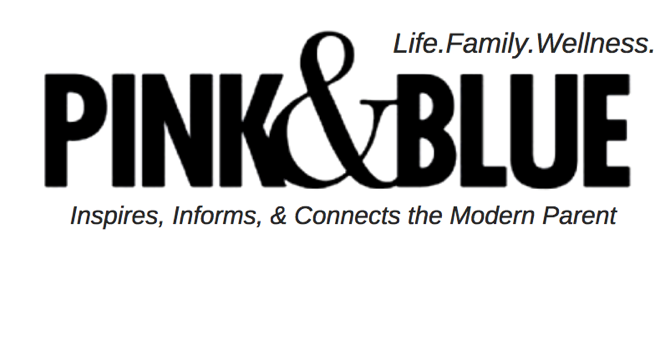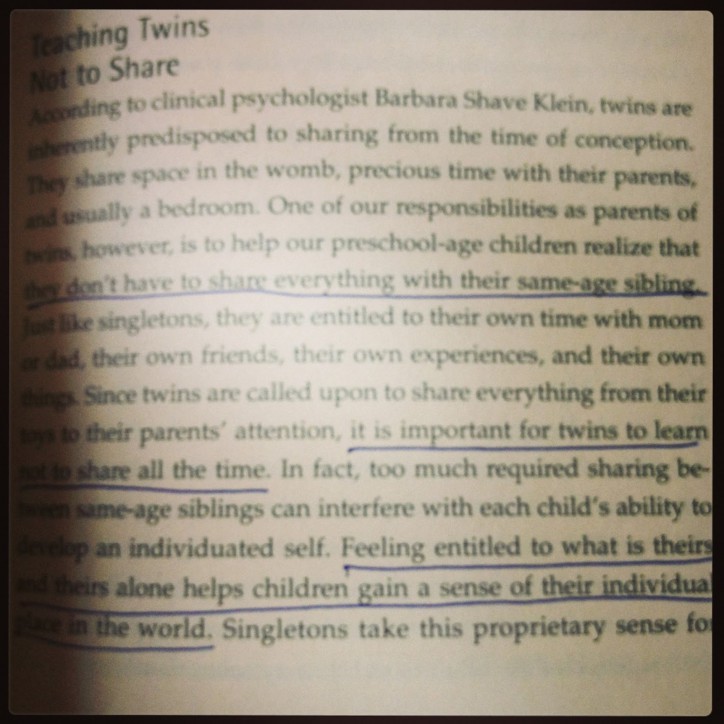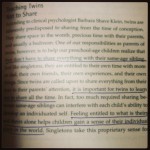Recently, I posted a photo on my Instagram @lovingyouischerrypie with an extract of a book that I just read called Emotionally Healthy Twins: A New Philosophy For Parenting Two Unique Children by Joan A. Friedman, Ph.D., and a lot of followers (all of them twin moms) asked about it. I haven’t come across very many twin-specific parenting books before this one; and so I figured it was worth sharing my thoughts on the book here on my blog.
The author of the book is not only a psychotherapist specializing in the treatment of twin-related issues but she is also a twin herself and the mother of twins. She has created the following parenting guidelines for helping twins develop into happy, self-realized, unique individuals and to overcome what she calls the “twin mystique”:
– think of your twins as two unique individuals
– expect to have different feelings for each child
– give each child consistent “alone time” with you
– don’t attempt to provide a “fair and equal” childhood for your twins
– don’t compare twins to each other; each is on his or her unique life path
– encourage twins to pursue their own friendships and interests
– don’t rely on your twins to be each other’s constant companion or surrogate parent
All of these points are meant to help parents face the unique challenges of parenting twins. The author makes the very valid point that many parents of twins seem to embrace the concept of encouraging individuality but most unwittingly undermine it. I’m sure I’m guilty of that. I try very hard to encourage their individuality and not treat my girls as a unit but I know there are times when it’s just more convenient to treat them as a pair like having them sleep in the same room for instance. That said, I felt that the author goes overboard with some of her suggestions in many cases. For example, she suggests that a woman pregnant with twins tell people that she is pregnant with two babies. I find that weird!?@!
Despite the fact that the author can be very heavy-handed in her idea of not getting caught up in the twin mystique, I think she does offer many good strategies for parenting twins. Here are some of the things that got me thinking, that I could relate to and that I would like to try to do (or not do)at our house with my notes in parenthesis:
– it is important to have single baby photos in the house and in each child’s baby book to send the message to the child that they exist on their own and are important as an individual {while I have tons of photo books and everything documented on my blog, I have yet to even start baby books that I have for each girl}
– what twin babies need is neither equality nor togetherness with their twin, they need a secure attachment with each parent
– too often parents unwittingly abdicate their connection to each baby in favour of connecting to the two as a set because they feel guilty about having unequal feelings towards them {I remember feeling very guilty when they were babies because I had different feelings towards each baby, I wish I knew then that it was not only normal but advisable to have those different feelings}
– if your babies are given the opportunity to experience themselves away from their twin sibling, they will have a better understanding that reality extends beyond “me and my twin” {we have been separating the girls more lately and it’s been a positive experience, still need to do it more though}
– If you cannot breastfeed your twins and feel like a failure because of it, your infants will not suffer from the lack of your breast but from your downcast mood…. Bonding with a baby is not all about the breast {again, I wish I could have known this back when I struggled to breastfeed my girls — although I did come to the decision on my own to stop breast feeding in favour of enjoying my time as a new mom and sparing my sanity but I could have done without the guilt}
– mothers of twins need to create their own standards whereby they accomplish what they can in the best way they can {the non-twin world doesn’t always understand that twin moms have to set their own standards}
– an important benefit of having twins is the expanded opportunity for a father to be involved with his children when they’re babies {I could not agree more with this, Matt was so involved with the girls from the moment they were born. He got up for every single feeding, changed diapers and swaddled like a pro}
– it’s not that pre-school age twins never fight or argue, but parents are understandably impressed with their twins’ compassion toward each other and their overall ability to get along. When it comes to their twin relationship, they seem to have interpersonal skills that singletons of the same age simply don’t have…. The problem is that twin relationships involving too much togetherness might push compassion into the unhealthy realm of negating one’s own abilities, desires and goals {I’ve always considered my girls’ ability to be compassionate as a positive, now I’m on the look-out to make sure it doesn’t go too far}
– time spent playing with your twin is not a substitute for one-on-one time with mom or dad. Nor does it offer the same opportunity for developmental growth as making new friends {note to make more time for one-on-one playtime}
– twin moms have to come to terms with the fact that their twins’ lives can’t be managed solely according to what was easiest or most convenient {this is a tough one for us but I get the point}
– it is important for twins to learn not to share all the time…. feeling entitled to what is theirs and theirs alone helps children gain a sense of their individual place in the world {this really jumped out at me because I have noticed my girls are starting to really showing an interest in claiming things as their own, we are thinking of giving them separate closets and drawers for their clothes}
– make sure that your preschool age twins have their own personal items…. other than big ticket items, make it clear to your children that what belongs to one does not belong to the other {I have started to write their names on things or use labels to underscore this point and to make it easier for us to differentiate}
– it’s important to realize there is an essential difference between missing one’s twin and needing him
– the author advocates for separate playdates, activities and birthday parties {all of which seem really impractical to me, especially at 2.5 years of age!!!!!}
– the author also advocates for separate classrooms {we are still completely undecided on where the girls will go to junior kindergarten next year and whether they will be in the same class, although my current feelings are that I would want them in the same class — the author does state that it is not advisable to separate young children abruptly and if they haven’t been separated then it’s probably best to have them placed in the same classroom for a year while they adjust to kindergarten}
– making an effort to establish your unique connection with each twin through alone time is particularly critical during the preschool years
– it’s best to see their developmental differences as a blessing because they help you acknowledge that each twin is unique {I will forever remember this point!}
– allow your twins to have squabbles and help them learn how to resolve conflicts through negotiation and problem solving. Alone time with each twin can help you understand what may be causing too many fights
– allow each child to gravitate to what interests him and let each one choose the after-school activities
– don’t compare report cards
– give elementary school-age twins as much emotional and physical space as possible
– I did not read the chapters on preteen, teenage and young adult twins because my mind can’t get that far ahead of myself!!!




